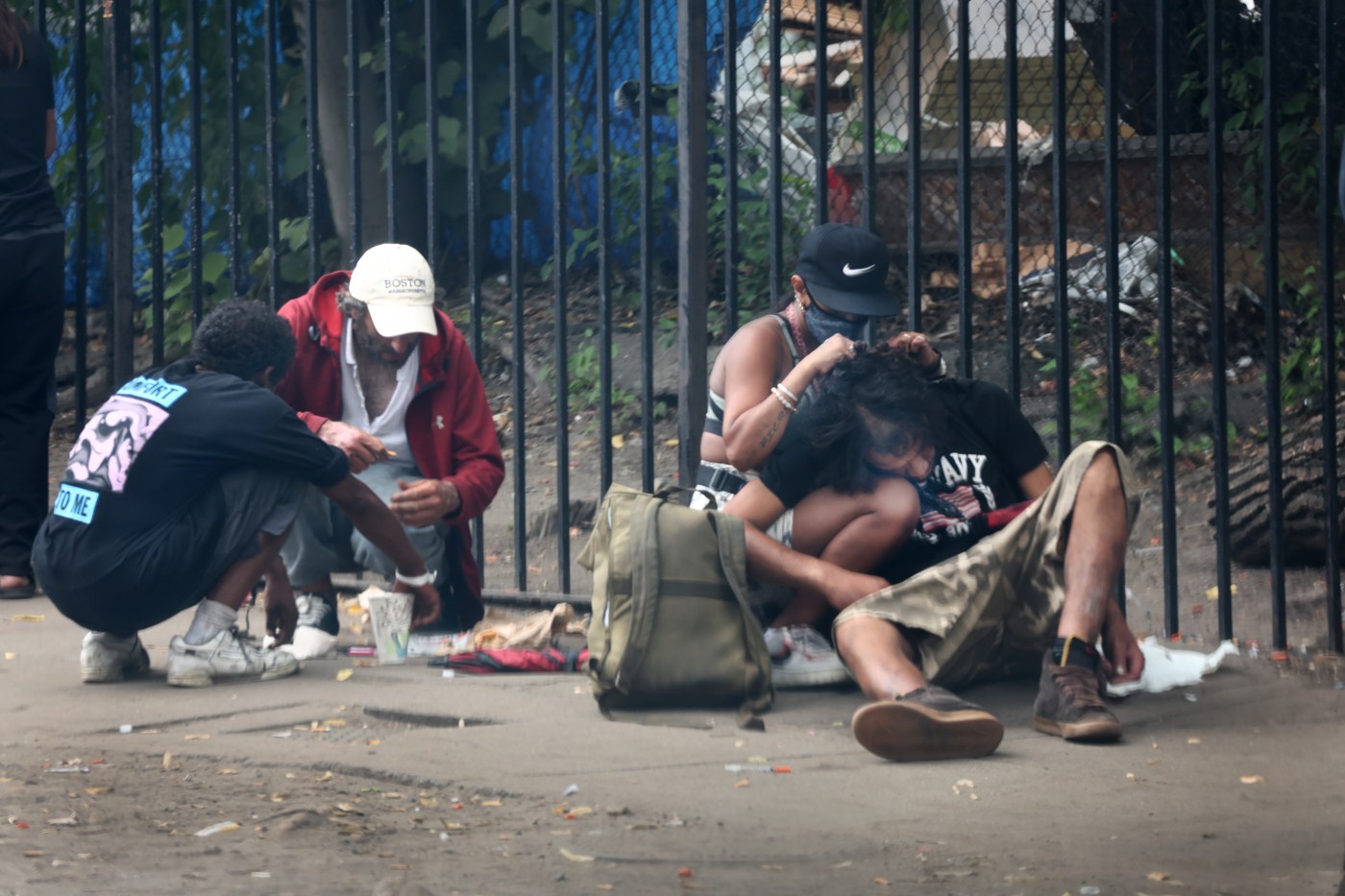
Boston’s Mass and Cass plan failed because it put housing before treatment, Massachusetts senator says
State Sen. Nick Collins is joining the chorus of voices calling for a new approach to combat Boston’s revived open-air drug market at Mass and Cass, saying that the mayor’s decision to put housing before treatment is what doomed her plan.
Collins said that while the Wu administration was able to connect many of the homeless and drug-addicted individuals frequenting the troubled area last summer with low-threshold housing, those people have not adopted a new, healthy lifestyle, and are rather returning to Mass and Cass by day to openly buy and use drugs.
“I think the city has admitted that the plan is not working,” Collins, a South Boston Democrat who represents neighborhoods impacted by Mass and Cass, told the Herald. “They took down the tents and that was progress. But the plan that is harm reduction and low-threshold housing is a disaster.”
Collins said the same problem occurred in prior years, when the city sought to cut down on violence, drug use and crowding at Melnea Cass Boulevard and Massachusetts Avenue by placing some of the inhabitants in cottages at Lemuel Shattuck Hospital, a transitional housing program that began in 2022 and was slated to end this summer.
He said the people were sleeping at the cottages and returning to Mass and Cass during the day, much like the current situation, “because they knew they weren’t getting prosecuted for drug dealing, drug use and human trafficking.”
“Sticking with the housing-first model would be the march of folly,” Collins said.
Collins joined City Councilor Ed Flynn, who represents South Boston and the South End, in characterizing the plan put forward by Mayor Michelle Wu last summer to tackle crime, homelessness and drug use in the area as a failure.
Both Collins and Flynn say the city should focus on cracking down on drug activity and crime, by arresting drug dealers, and getting addicts frequenting the area into long-term detox and treatment.
By focusing on treatment before housing, the city will begin to see success in cleaning up the area, Collins contends. Like other elected officials who have spoken out in recent days, he says the problem has arguably worsened this summer, in terms of the drug use, crime and filth spreading deeper into surrounding neighborhoods of Dorchester, Roxbury, the South End and South Boston.
While the Wu administration has not explicitly said that its plan is not working and needs to be changed, Collins said the mayor’s team indirectly said as much by speaking to the “urgent need for interventions” upon last month’s release of a Massachusetts Department of Public Health report on overdose deaths.
The report found that while opioid-related overdose deaths fell by 10% statewide, they increased by 12%, from 248 to 281, in Boston, and have climbed in the city each year since 2017.
“How do you ignore those statistics? And you can’t ignore the visual,” Collins said, pointing to his experience driving home and traveling through the intersection on Saturday, when his 6-year-old child was perplexed at the problem that continues to fester there and asked why nobody is helping the people there.
“A 6-year-old knows that this is a failure and it’s a lack of intervention,” he said.
He pointed to the success the city has seen with gun violence intervention, where trauma workers immediately respond to the emergency room after a shooting victim has been admitted and continue to work with surviving victims and families, and compared it to the less successful approach with opioid overdose victims.
After a person overdoses, is brought back to life when a first responder administers Narcan and taken to the emergency room, the intervention doesn’t typically continue beyond that, Collins said.
Many times, according to Collins, the person is discharged from the emergency room without treatment, and is soon back on the streets where they continue to be victimized or victimize others, until they’re back in the hospital or they become entrenched in the criminal justice system.
Collins said state lawmakers are debating changes to state law that would expand the ability to involuntarily commit and treat a person for an alcohol or substance use disorder for up to 90 days, and allow for extended stays.
He said the House has already advanced the bill, and anticipates it will come before the Senate in some form before the formal session ends on July 31.
Related Articles
Boston City councilors, state senator seek emergency declaration over Steward closures
It’s ‘decimating our community’: Patients and staff on edge as Carney closure looms
Massachusetts Senate OKs bill to create 264 new liquor licenses in Boston: ‘Long overdue’
Boston eying new plan to tackle revived Mass and Cass drug market: ‘We’re in a very tough spot’
Boston’s Charlestown neighborhood gets public pool back after two-year wait
While the law allows for certain public employees, like police officers and court officials, to petition the court system for involuntary commitment for substance use, today only families and blood relatives are typically choosing to take that route, he said.
Collins said the city should seek to intervene at the emergency room, by lobbying for people to voluntarily seek treatment after they overdose, and if that person doesn’t agree to do so, the public employee empowered to seek involuntary commitment should do so.
The city appears to be receptive at the moment to another proposal from three other elected officials, state Rep. John Moran, state Sen. Liz Miranda and City Councilor John FitzGerald, who are seeking to implement an interim recovery campus aimed at the addicts frequenting Mass and Cass.
Collins said the idea is worth debating, but he plans to continue to advocate for a floating hospital, which he has pitched as a medical ship in the Harbor that would primarily serve Mass and Cass homeless dealing with mental health issues or substance abuse.
“The facility is important, but it’s actually a policy that’s more important, because we could do this now without a facility,” Collins said. “If we intervened at the emergency room, this would go away. Everyone would be off the street for 90 days at a time like they are in Portugal. We’re not doing that. We’re not intervening. We could, but we’re not.”

